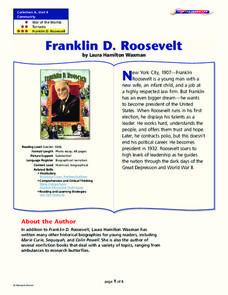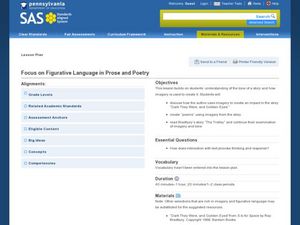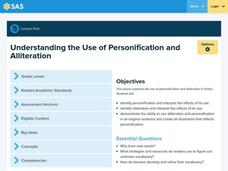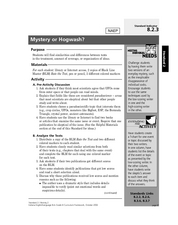Curated OER
The Rest Cure: Gender in Medicine and Literature
Read and discuss "The Yellow Wall-Paper" and the gender issues that the story brings up. Use articles from the time period to analyze, complete with specific discussion questions. After two days, scholars write an essay based on topics...
Curated OER
Franklin D. Roosevelt
Discuss the life of Franklin D. Roosevelt. This story, called "Franklin D. Roosevelt" by Laura Hamilton Waxman, is used to explore comprehension skills. Some of these skills include identifying prefixes and suffixes, making comparisons,...
Historical Thinking Matters
Spanish-American War: 1 Day Lesson
After analyzing newspaper articles portraying different perspectives of the explosion of the Battleship USS Maine, your young historians will take a stand on which position is the most believable in both discussion and writing.
Curated OER
Julie of the Wolves
Have your class practice their comprehension skills using this resource. After reading Julie of the Wolves by Jean Craighead George, learners engage in cause and effect activities, identify story elements and figurative language, and...
Curated OER
Foreshadowing and Prediction: W.W. Jacob's, "The Monkey's Paw"
W.W. Jacobs' story "The Monkey's Paw" provides plenty of foreshadowing which readers use to make predictions in this tightly composed, sound instructional plan. Your class reads the story, recording predictions and checking for veracity...
Curated OER
Focus on Figurative Language in Prose and Poetry
Students place emphasis on the use of figurative language when analyzing prose and poetry. In this figurative language lesson plan, students explore the tone of a story and its imagery. Students read and discuss how the author uses...
Southern Nevada Regional Professional Development Program
Was Bias A Factor? Make an Argument
The ability to analyze an argument is a skill emphasized by the Common Core standards. Offer your class an opportunity to develop and hone their skills by providing them the testimonies in an Oregon court case. After reading the facts of...
Curated OER
Literary Analysis: Summary vs. Analysis
What is the difference between summary writing and literary analysis? A 16-slide presentation offers some basic requirements for both types of writing and helps readers identify each based on keywords used in both types of writing....
Curated OER
Figurative Language
What is figurative language, and why do we use it? Introduce your high schoolers to some examples and discuss the importance of including this element in your writing. After studying a text and searching for examples, writers will...
Curated OER
Review of Personification and Alliteration
Young scholars study personification and alliteration in various fiction texts. In this literary devices lesson, students use various texts to identify the literary devices of personification and alliteration. Young scholars use examples...
National Endowment for the Humanities
Tales of the Supernatural
Scary stuff! Whether approached as the first horror story or a "serious imaginative exploration of the human condition," Frankenstein continues to engage readers. Here's a packet of activities that uses Mary Shelley's gothic novel to...
Curated OER
Setting the Tone with Figurative Language
Explore figurative language with your secondary class. Extending a language arts unit, the lesson plan prompts middle schoolers to examine how an author's word choice establishes a story's tone, possibly using metaphors, similes,...
Pittford Schools
Literary Devices, Techniques, and Elements
What's the difference between a speaker and an author? What's an example of anthropomorphism? Clarify the meanings of literary devices, elements, and techniques with a comprehensive glossary of terms.
Curated OER
Critical Analysis: "Behind the Formaldehyde Curtain" by Jessica Mitford
In this "Behind the Formaldehyde Curtain" worksheet, students analyze the purpose and the meaning as well as summaryize the text. Students determine three elements that the author used to make her point.
Curated OER
Connotation and Denotation: How Word Choice Affects a Paragraph
Review the terms denotation, connotation, diction, and mood in paragraph writing. After defining the terms, middle schoolers practice writing examples of both connotation and denotation. They complete a connotation and denotation graphic...
Reed Novel Studies
Where The Red Fern Grows: Novel Study
Does hard work and determination really pay off? It seems that way for Billy, a character in Where The Red Fern Grows. After working for two years, he finally has enough money to buy the pups he's always wanted. Scholars read about the...
Reed Novel Studies
Rules: Novel Study
Have you ever been so focused on others, that a look in the mirror surprises you? It seems that Catherine, a character in Rules, does just that when she focuses so much on her autistic brother's behaviors that she is surprised by her own...
Turabian Teacher Collaborative
Parts of Argument II: Article Critique
Break down the parts of argumentative writing with a critical thinking activity. High schoolers read an article of your (or their choice), and use a graphic organizer to delineate the ways the author structures his or her arguments.
Curated OER
Determining Importance
Students hone their skills at identifying the principle story in a work of art and text. Through discussion, students assess the central and supporting stories of a work of art that is characterized by multiple layers of action and meaning.
Curated OER
Introduction to Ludwig van Beethoven
"Ode to la Tortilla" and "Ode to Joy"? Sure! Use Gary Soto's poem to introduce learners to the ode format. After examining the descriptive words Soto uses, class members study a poster of Ludwig van Beethoven, suggest words that describe...
Pearson
Main Idea
The main idea of this resource is that you should take a look if you're planning to teach main ideas in your class! Cover just about everything you need to know about main ideas with a packet of materials that includes information and...
Curated OER
Gathering, Evaluating, And Organizing Information for a Report
Students gather and organize information for a research report on a topic of their choosing. Each students selects a subject for their research. Using traditional and electronic data they reference four or more appropriate resources...
Curated OER
Book Club Discussion: Things Fall Apart
Students read and discuss Chinua Achebe's novel Things Fall Apart. Students are guided to analyze the text through consideration of the author's use of 6 literary devices. Students also evaluate the text according to their personal...
Curated OER
Mystery or Hogwash?
Eighth graders choose topics of interest, and select books from the library about them. They utilize a worksheet embedded in the text which has the students rate the text they've read based on it's "believability factor." An interesting...
























